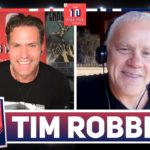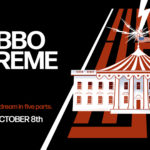February 15th 2005
I understand that last year at the gala Liza Minelli raised $50,000 by singing the song, Cabaret, from this very stage. In that tradition I would like to propose that a generous donor consider matching that gift tonight. In return I will not sing the song, Cabaret. Do I hear $5,000?
So here we are at Cinema for Peace. Susan and I have been having a wonderful visit, a little time away from the kids. We’ve met intelligent, progressively inclined actors, financiers, musicians, filmmakers; have had many discussions about art and the state of the world, all in the spirit of this festival, all in the spirit of peace, and then today I almost lost it and smashed somebody. I had just entered the Jewish museum and one of these stalker freaks with a camera who has been following us everywhere we’ve been in Berlin started to snap away. For me, the museum felt like a holy place, a shrine, and right there in that building dedicated to non-violence, right there on this visit to Berlin and the Festival of Peace, right there on Valentine’s Day, in that moment I almost smashed someone.
I stand here a fortunate person. Fortunate to have been born when I was born, in the place I was born. Walking today on the stone faces of the art installation by Menashe Kadishman at the Jewish museum, seeing the personal artifacts and photographs from not long ago one is reminded that terror is not far away, that the fear and hatred that led to the madness of the 1930s and 40s in Berlin is still amongst us. I am fortunate because I have not been asked in my life to kill for my country or witness the deaths of others in war. I know that there are many amongst us tonight who have not been that fortunate.
All of us are capable of violence. The instinct is in our genetic code. What differs from person to person, from country to country, from ideology to ideology, what differs is the breaking point, the point at which one’s desperation becomes too immense, one’s hope has disappeared, one’s anger, one’s rage is un-containable, the breaking point when the human being loses reason and takes another person’s life. There are breaking points occurring all over the planet tonight. Millions of young men and women have passed the boundaries of logic, of compassion, of reason, millions of desperate people are just waiting for the trigger that will release their rage, waiting for the words of an ideologue to provide their delivery, their rage manifesting itself in murder. Millions wait to be mobilized.
I know that there are some who believe Germany is beyond losing its reason. There is an amazing spirit in Berlin today. It’s a different city than when I first visited in 1983, completely different, a beautiful transformation. A real testament to what happens when freedom triumphs over oppression. A picture postcard of the benefits of Democracy. A glorious template of what can happen when true liberation occurs. But, but… there was a difference of a couple of percentage points in your last election. A woman said to me last night that if those 5 percent hadn’t voted “we would be in Iraq with you today”. The forces of ignorance and fear are always with us. Oppression and violence are one cataclysmic event away from being unleashed. Reason and compassion are things we must always battle for.
“It is no excuse to be young and uninformed.” So says Hitler’s secretary at the end of the recent film The Downfall by Oliver Hirschbiegel. The film shows how some young and ambitious people can be caught up in a movement’s idealism, how the average person can be taken along with the momentum of a majority. The momentum of the majority; the easy path, the path of the millions that temporarily prospered while the thousands that questioned, that stood in the way of the majority were swallowed up by it, silenced, imprisoned, murdered, deported and exterminated. A couple of years ago I directed a stage adaptation of Klaus Mann’s Mephisto. In this true story we see the courage of artists in Munich at a theatre called the Peppermill that resisted the rise of the Nazis through their art. Brave theatre artists threw obstacles of wit and satire in the way of the momentum of the majority. Some were imprisoned, some were killed, some took their own lives. One of the actors chose to go along with the majority and became a favorite actor of the Third Reich, eventually becoming an artistic leader in Nazi Germany, a post he held even after the war. The Actors Gang production of Mephisto raised many important questions for our company. How are we as actors responsible for our actions, our choices? How is what we choose to do on stage connected to the choices we make as citizens? How much will we compromise our political and moral beliefs for the demands of the market place? How much will we compromise our art to pay our rent? All important questions for us to address.
Now I can’t stand here and tell you that it is up to artists to stem the flow of ignorance and hatred that have led us into this violent new century. It would be too idealistic a request, a request that supposes that all artists can be counted on to act in any coherent, organized way. If you’re sitting at a table full of artists it takes an hour to order lunch. Artists are by nature, iconoclasts, not joiners. Some, myself included have relied on income from corporate entities whose other arms may fund some appallingly negative counterproductive entities.
In 1983 I funded my theatre companies production of an anti war play with my earnings from Top Gun. I would like to say that our production in our small theatre had as much of a cultural impact as Top Gun but I would be delusional if I did. But Top Gun did two very important things for me personally. It began me on a road that would lead me to better roles and enough influence in the industry for me to be able to finance Bob Roberts, Dead Man Walking, Cradle Will Rock, and Embedded. Top Gun was also my first real contact with enlisted men in the armed forces and forced a sixties anti-war activist to face the complexities of the difference between being anti-war and anti-military. Due to the people I met while shooting that film I could no longer simplify my politics. I met people I liked, drank with young men like me, came into contact with men serving with honor, who had chosen the military not to kill, but as a better way of life, a way towards a college education, a way to learn skills that would take them in the long run away from dead end jobs into jobs based on skills learned while serving. Simply put, there are as many honorable men and women in the military as there are honorable men and women creating art.
It does no one any good to separate things into black and white. The fortunate upper middle class in the U.S that send their sons and daughters to university to embrace the finer arts and find careers in architecture and design and theatre have no right to judge those that could not afford that path, that have to claw and scratch their way towards education and enlightenment. At the very first performance of Embedded in July 2003 I heard weeping at the end of the play. I strained to see which of my actresses was losing it, overacting. I realized it was someone in the audience. A woman came up to me after the show and poured out her heart. She was a career officer in the military and the play had struck a chord. “I know so many kids over in Iraq right now”, she said. “I trained them and I can’t go to bed at night without thinking that their lives are in danger because of a lie.”
The essential question that is in front of all of us at this crucial time is how do we as citizens, as artists, as soldiers, as businessmen, as mothers, as teenagers, how do we act on the facts that have been laid down in front of us? What actions can we take that reflect on the world as we see it? How do we take the experience that our lives have led us to and act upon it? I would propose to you that it is far nobler for the soldier returning from Iraq to resist his or her indoctrination and speak out against this war than it is for the artist. But it is incumbent upon us as artists to reach out to this soldier. It is consequently the responsibility of the artist and the responsibility of the citizen at large to hear this soldiers voice and to make sure that this voice is not silenced. This, ultimately, is the responsibility of those whose job it is to tell stories. To hear with compassion and without judgment the voice of those that have been in shoes we could not travel in and to tell their stories, to tell these stories honestly and with complexity. In the western world and particularly in the US the story of the dissenting warrior becomes the quick domain of media outlets that spin it into the story of the disenfranchised few rather than the courageous few. For every voice that finds the courage to talk there are hundreds in mute agreement. The western media is quick to marginalize these voices as voices of a minority, the battle weary, the weak, the unfortunate shell shocked and eventually, shamefully, the traitorous. This rather predictable and contemptible characterization of returning soldiers should be a call to arms for the storytellers amongst us. Here is our great challenge, to explore the flesh and blood of those that have experienced the horror of war and give it life on the canvas, on the page, on the stage or on the screen. The pitfalls involved with this are huge. If done poorly one does a disservice to the warrior and can wind up glorifying war. If done so honestly one can face the ire of not only the extremes of the right but of the left. Sam Fuller (a soldier himself) upon the release of his war film Steel Helmet was accused by the American Legion of being a Communist while at the same time being accused by the Daily Worker of having made a film that could have been directed by General Douglas MacArthur himself.
Sam Fuller made films from his own unique perspective. He approached his stories with the discipline of a good journalist. He told me once about working the crime beat in New York City in the thirties and covering a murder. There are many truths he said. There is the truth of the suspected murderer. There is the truth of the witness, of the policeman, of the suspected murderers mother. They’re all telling their own truth and they’re all lying. Your job as a journalist is to present as many of the questions of the story as you can but not to come to any conclusion. Your point of view is irrelevant. The questions you raise are the story. Sam Fuller made films with complex moralities. And he wound up ruffling enough feathers in Hollywood to end up in exile in his later years in Paris. Sam was an artist in the true sense of the word, and because of it could no longer work.
A young actress I know had just returned from doing press for a movie. During the interviews she had expressed her opinion on the Bush administration. During one of the interviews she was warned by a member of the British press: “Don’t you know,” he said, “how dangerous what you’re doing is?” “Dangerous?” she said. “To your career. People that express their opinions ruin their careers.”
A man I know, a famous television journalist who one would assume has a secure position at his network whispered to me as we walked away from the studio after an interview. Covering his mike he said, “Please continue to criticize this administration. Keep asking questions. We can’t say a word. We can’t even ask the questions.” “That’s kind of scary,” I said to which he replied, “You don’t know how scary it is.”
What is going on in America? Why is no one being held responsible for deceiving the American public? Why are so many questioning voices being intimidated into silence and acquiescence? Who suffers if there is a free, unfettered and un-intimidated press? Why does the Republican Party, which holds power in all three branches of government have such a thin skin towards criticism? One would think that a party with that much power wouldn’t be so concerned about the questions asked by journalists or by the opinions of actors. One has to wonder why anyone with that much power would spend so much energy quelling dissent and intimidating those that stand in their way.
Why is it acceptable for celebrities to influence fashion but repellant for them to influence thought? Why are actors attacked when they step out of their comfort zone of celebrity and criticize their leaders? Why are those in entertainment excoriated and marginalized by the media when they become involved in the process of their democracy? Is it because they might lead others to do the same? Does the consternation expressed to the socially involved filmmaker have anything to do with the influence they yield? Could it be that storytellers might reach people in ways that politicians and ideologues never can?
I suspect that films we have seen in the past few days, Sophie Scholl, Hotel Rwanda, Innocent Voices, will be remembered and respected long after any speech by Tony Blair or Colin Powell. These works of art speak truth to the human condition, to the horror and human loss of war and affect our hearts and our minds in ways that render irrelevant the rationalizations, lies and obfuscations fed to us by politicians and pundits as they beat their drums for a new war.
Some in the media would have us believe that storytelling is insignificant, that writers and actors and directors are naïve to the bigger picture, that they don’t understand the complexities involved in the geopolitical landscape that rules our planet. “Stand aside”, they say, “while more sophisticated minds sort things out. Trust us. We know what’s best.” They ask us to be joiners, to go with the momentum of the moment. They intimidate us into a willful majority. They intimidate us into silence. And I think of the satirists in Klaus Mann’s Peppermill, and I think of the compliant masses swayed by the lies of the Bush administration into believing that there were weapons of mass destruction and I see even now the media cooking up a new war in Iran, and I think maybe it’s time to trust the satirists and the artists and the activists and even the politicians that said wait a little longer before you risk the lives of the innocent to create democracy. Perhaps we should trust the cautious. Perhaps we should trust the career soldier returning from the war and not the draft evader sending new recruits into battle. Perhaps we should trust truth before ideology, science before fundamentalism, It is time to trust our hearts, the human heart that resists killing and embraces compassion and reason. With the heart of an artist and the soul of a warrior we must once again reject the fist of the fool.


